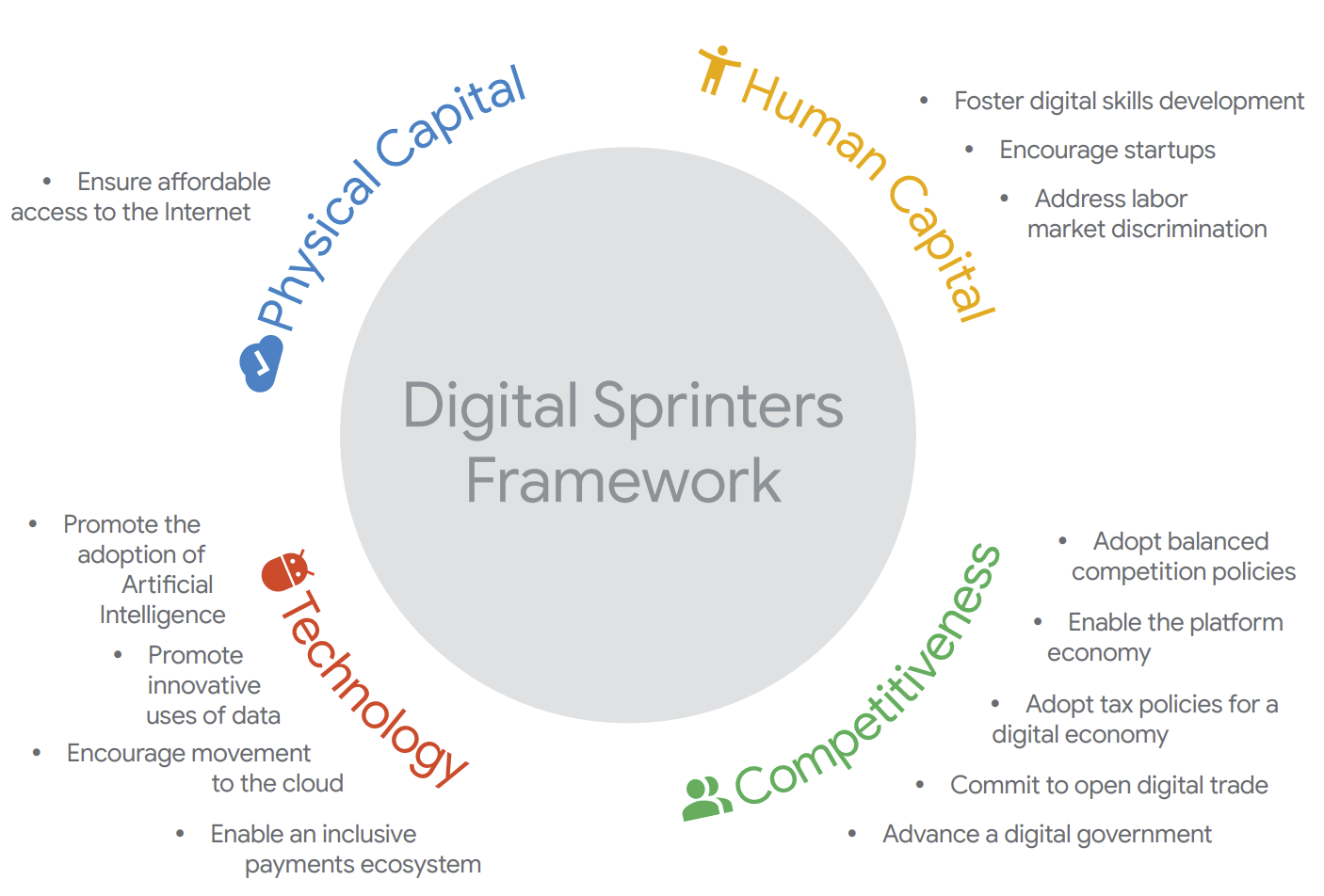يواجه الأشخاص في جميع أنحاء العالم تحديات نادرة تتمثل في جائحة عالمية وتراجع اقتصادي بنسب غير مسبوقة وتزايد مطالبات تحقيق العدالة وضغوطات هائلة على الموارد المالية.
وتنعكس نتائج هذه التحديات بشكل خاصّ على الأسواق الناشئة. ففي حالات كثيرة، تكافح هذه الأسواق لإدارة الجائحة في ظل انخفاض الموارد الصحية العامة المتاحة لديها وارتفاع نقاط الضعف الاقتصادية فيها. ومع ذلك، تتمتّع الأسواق الناشئة أيضًا بأنظمة اقتصادية من بين الأكثر حيوية ونشاط ريادي من بين الأكبر في العالم. وباتّباع أطر السياسات المناسبة، يمكن لهذه الأسواق أن تصبح منصات انطلاق مثالية للابتكار في المستقبل. وقد تكون هذه اللحظة العصيبة الوقت المناسب تمامًا لكي تسعى هذه الأنظمة الاقتصادية إلى تحقيق تحوّل رقمي من خلال توجيه جهود التعافي الفوري نحو تحقيق مكاسب اقتصادية مستدامة.
الانضمام إلى "Digital Sprinters"
نُطلق على هذه الأنظمة الاقتصادية الناشئة اسم "Digital Sprinters" لأن لديها قدرة على الإنطلاق نحو التنمية الاقتصادية من خلال اكتساب المزيد من التقدُّم الرقمي. وبناءً على تجاربنا، نحن نعتقد أنّه يجب على الحكومات والقطاع الخاص التركيز على أربعة مجالات رئيسية كما هو موضّحٌ في تقرير سنُصدره اليوم:
رأس المال المادي: يتعلّق بإمكانية الاتصال الرقمي والبنية التحتية. ولا يقتصر رأس المال المادي على الاستثمار فقط، بل أيضًا على كيفية إدارة البنية التحتية.
رأس المال البشري: تحتاج البلدان إلى اتّباع نهج شامل لتدريب الأيدي العاملة وتحقيق الأمن الاقتصادي وريادة الأعمال ومكافحة التمييز.
التكنولوجيا: زيادة استخدام البيانات والذكاء الاصطناعي والحوسبة السحابية، ما يؤدي إلى تعزيز نمو تقنيات الأجيال التالية وإطلاق العنان للنمو المستقبلي. وهذا يعني توفير فرص جديدة بالإضافة إلى طرح أسئلة حول أفضل السبل للاستفادة من هذه التقنيات.
المنافسة: التركيز على السياسات التي تُشجِّع الأسواق التنافسية والمفتوحة والمعايير التنظيمية القابلة للعمل المشترك والأنظمة الضريبية التي يمكن توقّعها بناءً على المعايير الدولية.
تعكس المقترَحات التي نقدّمها مجرّد وجهة نظر واحدة بشأن أطر السياسة العامة التي ترعى التحوّل الرقمي. ونحن نأمل أن يساعد هذا التقرير في تعزيز المحادثات حول النمو الناتج عن التحوّل الرقمي، وذلك بين الحكومات والمجتمع المدني والمؤسسات الدولية والأكاديمية ورجال الأعمال.
المكاسب الاقتصادية المحتمَلة
يمكن أن يحقق التحوّل الرقمي مكاسب اقتصادية هائلة. فقد توصّلت دراسة جديدة إلى أنه بحلول 2030، يمكن أن يؤدي التحوّل الرقمي إلى إنتاج 3.4 تريليون دولار من القيمة الاقتصادية في أسواق Digital Sprinters هذه. لتقديم بعض الأمثلة على مستوى البلدان العربية، يشكِّل هذا الرقم نسبة 52% من الناتج المحلي الإجمالي في الإمارات العربية المتحدة ونسبة 31% في المملكة العربية السعودية ونسبة 28% في مصر.
تواجه الأسواق الناشئة اليوم لحظة حاسمة. فعلى الرغم من تسبّب فيروس كورونا المستجد (كوفيد-19) في عرقلة النظام العالمي وقطع سلاسل الإمداد، لدى الأسواق الناشئة فرصة في التحوّل رقمي والظهور كجهات تنافسية قوية. ونحن نأمل أن تساعد هذه التقارير المنشورة اليوم صانعي القرار على الاستفادة من فرص التحسين هذه.
بقلم سليم اده، رئيس الشؤون الحكومية والسياسات العامة في الشرق الأوسط وشمال أفريقيا.
The opportunity for “Digital Sprinters”
People around the world are confronting once-in-a-generation challenges: a global pandemic, an economic downturn of unprecedented proportions, rising demands for equity, and dramatic strains on financial resources.
The rain from this perfect storm is falling hardest on emerging markets. In many cases, they’re struggling to manage the pandemic with fewer public health resources and also suffer from greater economic vulnerabilities. Yet emerging markets also have some of the most vibrant economies and greatest entrepreneurial energy in the world. With the right policy frameworks, they can become ideal launching pads for future innovation. This challenging moment may be exactly the right time for these economies to pursue ambitious digital transformation, using their immediate recovery efforts to develop sustainable economic gains.
Becoming “Digital Sprinters”
We call these emerging economies “Digital Sprinters” because, by becoming more digital, they have the potential to sprint ahead toward economic development. Based on our experiences, we believe governments and the private sector should focus on four key areas, as detailed in a report we are releasing today:

Physical capital: this is about digital connectivity and infrastructure. It’s not just about investment but also how infrastructure is managed.
Human capital: countries need a comprehensive approach to worker training, economic security, entrepreneurship, and combating discrimination.
Technology: increasing the use of data, artificial intelligence, and cloud computing, which empower the growth of next-generation technologies and unlock future growth. This means new opportunities alongside new questions about how best to harness these technologies.
Competitiveness: policies that promote competitive and open markets, interoperable regulatory standards, and tax regimes that are predictable and based on international standards.
Our recommendations reflect just one perspective on public policy frameworks for digital transformation. We hope that the report will help advance conversations about digitally-driven growth among governments, civil society, international organizations, academic institutions and entrepreneurs.
Potential economic gains
The economic potential from digital transformation is huge. A new study finds that, by 2030, digital transformation could generate as much $3.4 trillion of economic value in these Digital Sprinter markets. At a country level this translates to 52 percent of GDP in UAE, 31 percent in Saudi Arabia and 28 percent in Egypt, to name a few examples.
Emerging markets face a watershed moment today. As COVID-19 is disrupting world order and breaking supply chains, emerging markets have an opportunity to transform and emerge as stronger players. We hope these reports published today can play a part in helping decision-makers take advantage of these opportunities.
By Selim Eddé, Director of Government Affairs and Public Policy for Google MENA